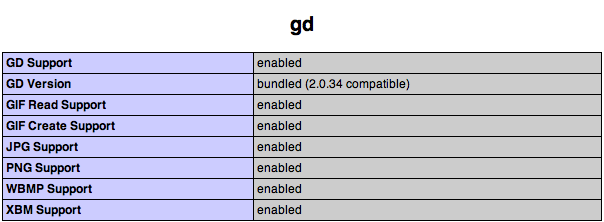Table of Contents
Shortnote
The PHP GD module is required by many HTTP-driven services in order to render, convert and generally process image files.
The Cydia package phpgd provides the libgd.so extension and enabled it in the /usr/lib/php.ini configuration file.
Enabling the Extension
After installing the phpgd package, make sure that the extension is enabled. The file /usr/lib/php.ini must contain a line:
extension=gd.so
that tells PHP to load the gd.so extension.
The next step would be to restart lighttpd in order to make sure that php-cgi is restarted.
Checking
In order to test that gd support is enabled, you can create a php file in your web-root called phpinfo.php with the following contents:
- phpinfo.php
<?php phpinfo(); ?>
Then, by pointing your browser to your iOS device, for example http://192.168.1.10/phpinfo.php, you should see a page containing the various PHP parameters as well as all enabled modules.
To check that the PHP gd module is working, search the document for gd section. If the gd module is working, it should look like this:
Notes
The alternative to using the PHP gd module is to use Imagemagick. However, Imagemagick chews a lot of memory that is barely noticeable under a desktop system but unsuitable for a VPS or mobile device.
